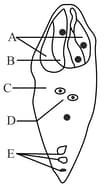The Pistil, Megasporangium and Embryo sac
The Pistil, Megasporangium and Embryo sac: Overview
This topic consists of various concepts like Nucellus,Integuments of Ovule,Apocarpous Pistil, etc.
Important Questions on The Pistil, Megasporangium and Embryo sac
In the given figure of embryo sac, choose the option that is correctly showing the parts (1), (2), (3) and (4).

Which of the following represents the persistant remains of nucellus ?
The megaspores are formed from megaspore mother cell that are produced in which of the following region of ovule:
Statement I: The megaspore mother cell divides mitotically to produce four spores.
Statement II: Megaspore mother cells are diploid and megaspore is haploid.
Which of the following pairs has haploid structures?
Embryo sac occurs in
Which of the following structure represents female gametophyte in angiosperms-
Which of the following sequence is correct for the development of embryo sac?
The ovule of an angiosperm is technically equivalent to :
Development of single embryo sac from MMC is called?
Is carpel and pistil same?
Typical mature embryo sac of angiosperm is
The ovule of angiosperm is technically known as :
_____ is the region on which, the ovule is connected to funicle.
The entry of oxygen and water into the seed during germination is facilitated by
In the given diagram, nucleated stage of the embryo sac is shown. Select the option with the correct identification.

Identify the position of the ovary in given diagram.

Formation of megaspores is called as:
Read the following statements and select the incorrect one(s):
I. The vegetative cell is bigger, has abundant food reserve and a large irregularly shaped nucleus.
II. Pollen grains are rich in nutrients.
III. Cells of the nucellus have abundant reserve food materials.
IV. Three cells are at the micropylar end and are called the antipodals.
Select the correct statement:
